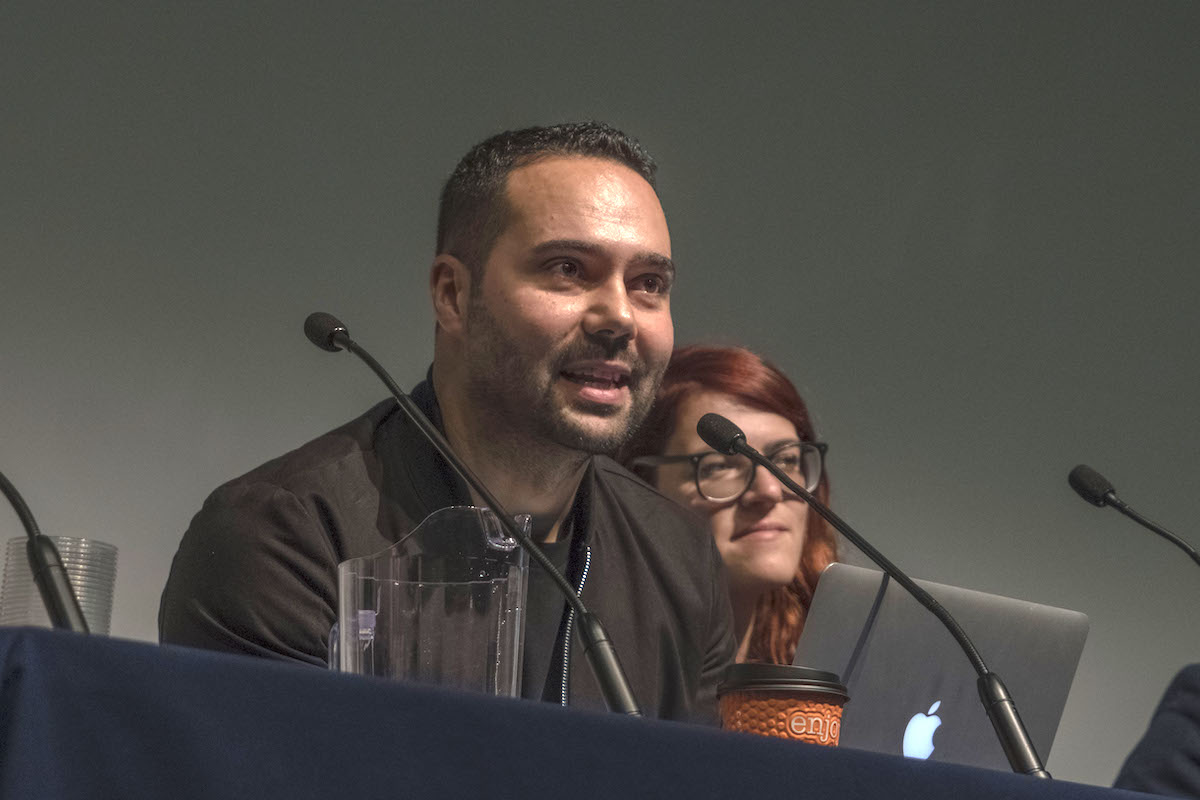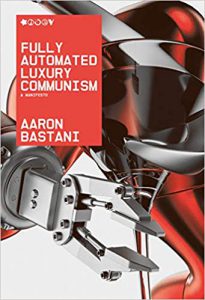Books
Fully Automated Luxury Communism—A Review
Like almost every other communist before him, Bastani wants to reach communism via socialism. Thus, the fact that socialism has already been tried more than two dozen times, and failed every time without exception, should be somewhat relevant to this book.

A review of Fully Automated Luxury Communism by Aaron Bastani, Verso, 288 pages (June, 2019)
In one of the opening chapters of Fully Automated Luxury Communism, Aaron Bastani cites a famous passage from the Communist Manifesto:
The bourgeoisie […] has been the first to show what man’s activity can bring about. It has accomplished wonders far surpassing Egyptian Pyramids, Roman aqueducts, and Gothic cathedrals; it has conducted expeditions that put in the shade all former Exoduses of nations and crusades.
This quote conveys a sense of Karl Marx’s ambivalent attitude towards capitalism. Disgusted as he most famously was by capitalism’s excesses, he was clearly also impressed by its immense productive potential. He reconciled these conflicting impulses by dreaming up a theory of history in which capitalism represented a necessary but transient stage in the story of human progress. Marx believed that capitalism was a powerful engine of economic development up to a point. But beyond that point, it would increasingly become a hindrance. Understood in this way, there is no contradiction between acknowledging—or even marvelling at—the progress capitalism has achieved to date, while also predicting its imminent downfall, and advocating its replacement with something else.

I get the impression that Aaron Bastani sees a lot of himself in that Marx quote. Bastani is clearly fascinated by technological progress; in fact, he talks more about that than about communism. Fully Automated Luxury Communism (FALC) is really two books in one—a technology book, and a communism book. In the technology sections, Bastani marvels at recent advances in areas such as information and communication technology, Artificial Intelligence and automation, energy generation, space exploration, agriculture, and medicine. Bastani not only believes that the current pace of progress is going to be sustained, he is convinced it will accelerate—the best is yet to come. There is nothing particularly communist about these passages; in fact, a lot of them could easily have been written by a libertarian tech-optimist (although the latter would obviously have drawn completely different conclusions).
My guess is that, if pushed, Bastani would probably (if somewhat grudgingly) concede that this cornucopia of technological wonders is, to a very large extent, a product of capitalism. Yes, publicly funded research has also played a role. But there is a rather large difference between developing the basic outlines of a technology, and turning it into a useful, scalable product that customers want to buy. The latter requires entrepreneurship, competition, and consumer sovereignty.
But, as mentioned, acknowledging capitalism’s achievements, and advocating its replacement, need not be contradictory in a Marxist perspective. Marx believed that capitalism was already past its prime, and that the end was nigh. Bastani believes that, even though this did not come to pass, Marx’s predictions were still essentially correct—he just got the timing and the exact reasons for capitalism’s demise slightly wrong.
Marx thought that the technological advances brought forth by what Bastani calls the “Second Disruption” (the Industrial Revolution) were creating the conditions for socialism. Bastani argues that this was premature, and that capitalism first had to reach a higher stage—a stage Marx could not possibly have foreseen. Bastani calls this the “Third Disruption,” by which he means, loosely, the technological changes we are experiencing today. This, he insists, is the stage that finally makes it possible—and necessary—to move beyond capitalism.
Why?
FALC offers a number of reasons, one of which is that technological advances are replacing scarcity with abundance, or what Bastani calls “extreme supply.” Capitalism, he claims, does not cope well with abundance, since it leads to a collapse in prices, and potentially, of entire markets. Capitalists see abundance as a threat, which they will fight tooth and nail. They will try to create artificial scarcity where scarcity no longer needs to exist: “[U]nder conditions of abundance,” he announces, “capitalism pursues a form of rationing in order to ensure profits.” This, in the FALC version, is how capitalism is transformed from an engine of progress into a hindrance.
Bastani also believes that under capitalism, automation will lead to widespread “technological unemployment.” Capitalism thus turns advances, which should be a huge boon for all of us, into a source of economic anxiety. He rejects the notion that the lost jobs will simply be replaced with new ones. So far, he says, this has not happened: “Eighty percent of today’s professions existed a century ago […] [T]he lines of work nearly everyone performs […] aren’t particularly new.”
In FALC, the demise of capitalism is not something that will occur in the distant future, but something which is already well underway. He identifies 2008 as the crucial turning point, the beginning of capitalism’s inevitable demise: “What we know for certain is that the status quo can’t hold. There is no consent for a system which, on nearly every measure, is going backwards. […] [The] economic crisis, beginning in 2008, […] only presents the first stage of a prolonged period of global disorder. Over the coming decades we will […] endure the aftershocks of the failure of this economic model.”
So, what would the path to Fully Automated Luxury Communism look like? Bastani sketches out a partial roadmap. Firstly, at the national level, there would be an immediate end to outsourcing by the public sector. Public sector organisations would provide the full range of services they are supposed to provide in-house, rather than involving external contractors. There would, for example, be no private rail operators anymore.
At the local level, meanwhile, there would be a programme of “municipal protectionism.” Public sector bodies and related organisations would spend as much of their budgets as possible locally, in order to retain money in the local economy, rather than allowing it to leak out. He calls this the “Preston Model,” after a city in the North of England, where, according to Bastani, a small-scale version of this approach has triggered “a multiplier effect taking off in the city as pounds [are] continually recirculated throughout the local economy.”
He wants to see the Preston Model replicated across the country, but with a wider remit:
[L]ocal, worker-owned business would be actively favoured […] [T]he only companies able to bid for specific local contracts would have to meet specific criteria, whether it is being based within a certain distance (perhaps ten kilometres or within a county or state); being a worker-owned cooperative; offering organic products or being powered by renewable energy.
There would also be a network of state-owned local and regional banks, pursuing similar objectives:
In keeping with the new ethos of municipal protectionism, these banks would be similarly restricted in their lending both by amount and geographical area. What is more, their remit would be to maximise social value as well as returns, focussing on energy transition and accelerating specific sectors as well as financing a new wave of worker-owned businesses.
Bastani briefly toys with the idea of Universal Basic Income (UBI), but quickly dismisses it in favour of the in-kind version, Universal Basic Services (UBS). This is mostly because variants of UBI have also been advocated by people he dislikes, namely Milton Friedman and Friedrich Hayek, which makes the idea suspect. He also he sees UBS as yet another way to reduce the role of the market and increase the role of the state in economic life. Under a UBS system, the state would provide the necessities of life, generously defined, to everyone free at the point of use.
Central banks would also play their part: “[I]n the transition to FALC the role of central banks will change once more, the emphasis moving away from low inflation […] to rising wages, high productivity and affordable house prices.”
Taken together, such measures would create a heavily state-dominated, hyper-politicised economy. This is where Bastani’s road map ends. What the final steps towards full communism would look like—or, indeed, what FALC itself would look like in practice—does not become clear.

But hasn’t communism been tried in the past? Not according to Bastani:
While it is true that a number of political projects have labelled themselves communist over the last century, the aspiration was neither accurate nor […] technologically possible. “Communism” is used here […] to denote a society in which work is eliminated, scarcity replaced by abundance and where labour and leisure blend into one another.
And later:
FALC is not the communism of the early twentieth century […]
[U]ntil […] the Third Disruption, communism was […] impossible […] Instead it was socialism, still defined by scarcity and jobs, which became the North Star for hope across the World. The technologies needed to deliver a post-scarcity, post-work society […] were absent in the Russian Empire, or indeed anywhere else until the late 1960s.
There are a number of major problems with all this. Firstly, the idea that capitalism cannot cope with “extreme supply” is absurd. Visit any supermarket, and you will find hundreds of products that would once have been quite expensive, and which anyone can now purchase for a trivial sum. (In a variety store, that is true of practically every single item.) “Extreme supply” simply leads to the adoption of a high-volume/low-margin business model.
That, at least, was the old-fashioned way. Today, some of the richest people in the world, such as the founders of Google or Facebook, have made their fortunes by offering services that are essentially free at the point of use. They do not need to charge individual users for individual transactions. They have found other, more creative ways to make money from offering those services. One of the great strengths of capitalism is that it allows experimentation with a plethora of different business models, including a variety of different pricing and revenue-raising strategies.
This is not applicable to every sector, and there are indeed examples of “extreme supply” leading to the disappearance of an industry. Travel agents are a good example. Until about 20 years ago, travel agents were ubiquitous. Their business model rested on the fact that, before the widespread use of the internet, the information someone needed to plan a holiday properly was in short supply, and hard to access. It therefore made sense to have a specialised middleman. The emergence of online booking forms, price comparison sites, online ratings, and so on has created an “extreme supply” in information, which has obviated the need for travel agents. As a result, the sector has shrunk drastically. In the same way, the emergence of streaming media has created an extreme supply in movies and television series, which has led to the disappearance of DVD rentals.
But this is simply the “creative destruction” of the market economy in action. Business models and industries become obsolete and disappear, and new ones emerge to take their place. The technological developments Bastani describes will, no doubt, trigger further changes of a similar kind in the future. But the mistake Bastani makes is that he confuses threats to specific business models, specific incumbents, or specific industries with a threat to “the system” as a whole. Creative destruction is not a threat to “the system”—it is the system.
What about Bastani’s policy programme?
Virtually all economists, including vocal left-wingers such as Paul Krugman and Joseph Stiglitz, agree on the benefits of free trade, and the inadequacy of protectionism. If this is true at the national level, it must be a fortiori true at the local level, which makes “municipal protectionism” a complete non-starter. The idea that cities can get rich by preventing money leaking out is so preposterous that it does not deserve a serious rebuttal. Let’s just say this: if protectionism works for Preston as a whole, why not go a step further, and stop the north of Preston from trading with the south of Preston? Would that not make both them even richer, because North Preston’s money would no longer leak out to South Preston, and vice versa?
Bastani’s claim that outsourcing is, in some way, central to neoliberalism is equally silly. If it is so central, why does he not produce a single quote from a pro-market economist advocating it? I am a free-market economist. I have no view whatsoever on whether St Thomas’s Hospital should employ its own cleaners and catering staff or buy those services from specialised external providers. It simply depends on the specifics: the relative cost of each option, the quality and reliability of the available service providers, the hospital’s management capacities, and so on. It would be absurd for an economist, “neoliberal” or otherwise, to have a general ideological preference either way. Such decisions should simply be left to the organisation in question. There does not need to be a national policy on this at all.
UBS suffers from the same problems as UBI, plus various additional ones. Most Western welfare systems are not particularly well targeted now, and a UBI would exacerbate that by an order of magnitude; it would essentially mean handing out billions of pounds to people who do not need it. The same is, by extension, true of UBS. But UBI at least gives recipients freedom of choice—it is up to them what they want to spend their UBI on. UBS denies recipients that freedom—it is like a version of UBI in which every pound is earmarked for a specific purpose, only worse. It would lead to the creation of vast new state bureaucracies, which, for all the talk of how FALC is allegedly incomparably different from earlier socialist projects, sounds suspiciously like old-fashioned socialism again.
Bastani’s proposed system of hyper-politicised banking and hyper-politicised local government contracting, meant to boost worker cooperatives and other types of organisations of which he approves, is a surefire recipe for patronage, nepotism, subsidy fraud, and waste. What he describes is not new, and it is very similar to what happened in Venezuela (as I have explained in more detail here, pp. 228-232), except that they did it using oil money rather than state-owned banks and local government finance. But the result would be the same.
Bastani claims that “communism” has never existed, because “communism” is defined as a post-scarcity economy, in which people no longer need to work for a living. Public ownership of the means of production is not enough; on its own, that is just socialism, not communism. This is, of course, technically correct, but it is a technicality just the same. Bastani knows as well as anyone that we sometimes informally describe systems (the Soviet Union, Maoist China, North Korea) as “communist” when the technically correct term would be “socialist.” But linguistic pedantry does not save his case.
Bastani’s argument is not that we should wait for another 100 years or so until the technology is sufficiently advanced, and then move straight from capitalism to communism. He wants the transition to start today—or, better still, yesterday—and he envisages a long transition period, during which our economy would no longer be capitalist, but not yet communist either.
There is a word for this: socialism. Like almost every other communist before him, Bastani wants to reach communism via socialism. Thus, the fact that socialism has already been tried more than two dozen times, and failed every time without exception, should be somewhat relevant to this book. But on that issue, Bastani has next to nothing to say. Like most socialist manifestoes, FALC ultimately boils down to “next time will be different, because I say so.”






